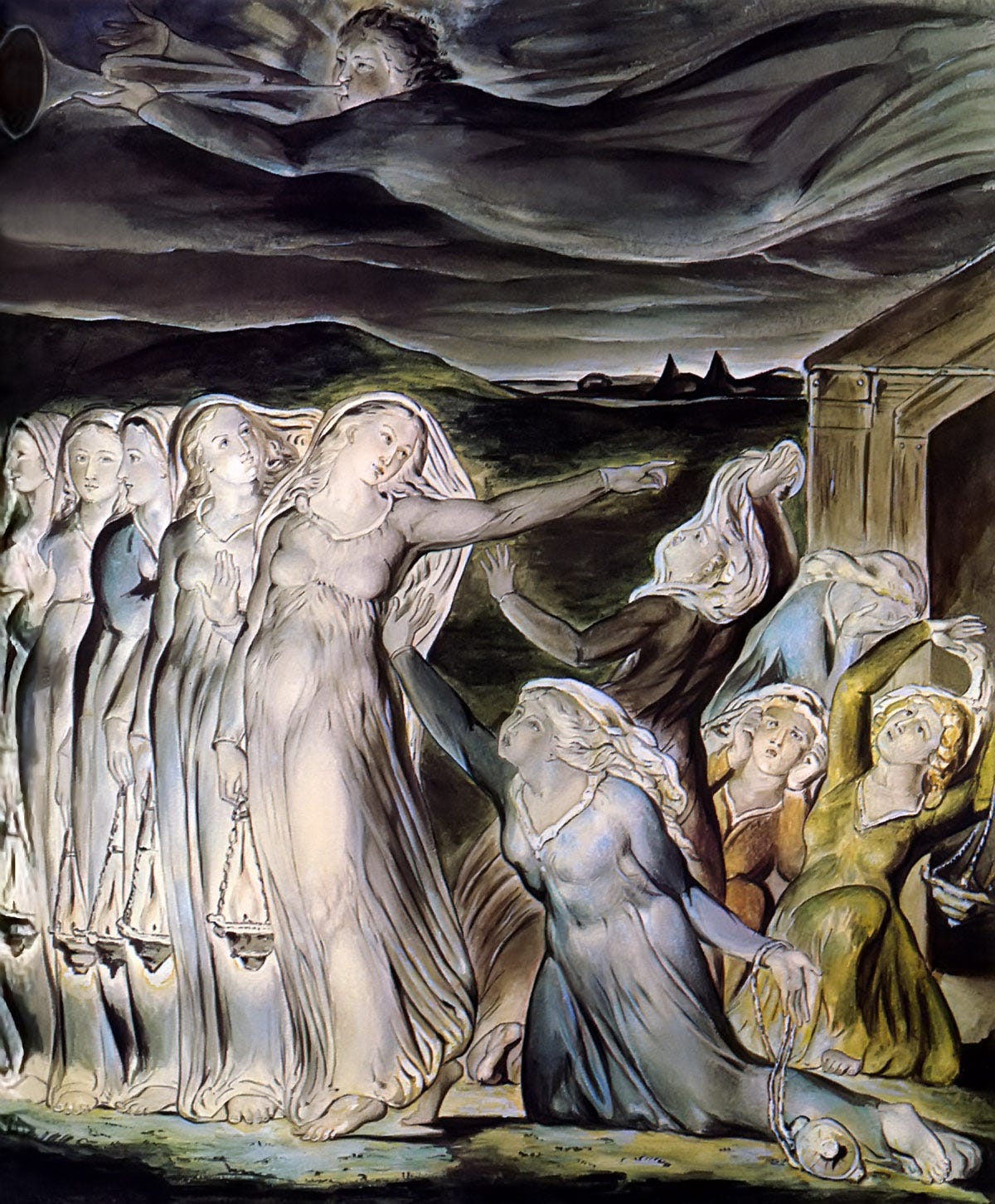(William Blake - Ten Wise and Foolish Virgins, Metropolitan Museum of Art)
Ten Virgins Bearing Lamps
by Kristen West McGuire
Matthew 25:1-13 (Douay Rheims Bible online)
Then shall the kingdom of heaven be likened unto ten virgins, which took their lamps, and went forth to meet the bridegroom. And five of them were wise, and five were foolish. They that were foolish took their lamps, and took no oil with them: But the wise took oil in their vessels with their lamps. While the bridegroom tarried, they all slumbered and slept. And at midnight there was a cry made, Behold, the bridegroom cometh; go ye out to meet him. Then all those virgins arose, and trimmed their lamps. And the foolish said unto the wise, Give us of your oil; for our lamps are gone out.
But the wise answered, saying, Not so; lest there be not enough for us and you: but go ye rather to them that sell, and buy for yourselves. And while they went to buy, the bridegroom came; and they that were ready went in with him to the marriage: and the door was shut. Afterward came also the other virgins, saying, Lord, Lord, open to us. But he answered and said, Verily I say unto you, I know you not. Watch therefore, for ye know neither the day nor the hour wherein the Son of man cometh.
Context: Weddings in biblical times were arranged by the family patriarch. Once the betrothal was made, it was legally binding. The wedding took place when the bridegroom brought the bride home, which in some cases took as long as a year. So, weddings were akin to housewarmings. When the fiancé sent the word “ready,” his espoused waited with ten of her closest female relations, her bridesmaids. The celebration began at night so all could enjoy the procession. The marriage was not physically consummated until after the long party. The celebration was more involved than our weddings.
Translation: This story probably was originally told in Aramaic, the Semitic language spoken by Jesus. Scholars are not sure who translated this parable into Greek, but it is mentioned by Ignatius of Antioch in the first century A.D.
Vocabulary:
Lamps: The lamp was really more like a torch. A rag soaked in oil was affixed to a stick. To keep the torch burning for a long while (some weddings lasted as long as a week), flasks of oil were needed.
Virgins: Most translations use the term virgins, including Jerome’s Vulgate (Greek parthenos; Latin virginis). The purity of young maidens was assumed.
Wise/foolish: (Greek: phronimos/moros) Also given as prudence, Matthew contrasts the wise and the foolish elsewhere, and the difference can be found in good deeds. Here, the oil symbolizes good deeds.
Stay awake: Rendered also “to watch” or “be vigilant,” it connotes the readiness to act that the nervous wedding participants know. How will that union of persons change us? Watch, and find out!
Meditation: Brides usually choose close relatives and friends for their attendants. It’s an honor to be asked. Still, potential bridesmaids might justly why they ought to care about the needs of “bridezilla.” A wedding is not just a perfect day for a princess, but the serious beginning to a new way of life. Christian discipleship is similarly radical.
This parable highlights the joy we ought to reserve for our final union with God, and the preparation for that union that begins with our relationship to the bride. While Protestants are not so sure, I am convinced that this parable has a single Bride (Mary), to whom we cleave as we wait for Jesus (the bridegroom) to bring us back to that home He has prepared for us.
In the ebb and flow of family and close friends, we work out our salvation. No one is unaffected by our sins while we wait. Waiting with Mary for Jesus, we will not have to worry about the baubles on the banquet tables, but whether our hearts are adorned properly and lit with the oil of good deeds done for love.
Discussion Questions:
1. Are you, or were you, bridezilla? Or do you know a bridezilla? What’s the cure?
2. As Mary’s attendant, do you feel more like a distant cousin or a treasured friend? How could you get to know her better?
3. Do you worry about when Jesus will come in glory? Why? Or, why not?





